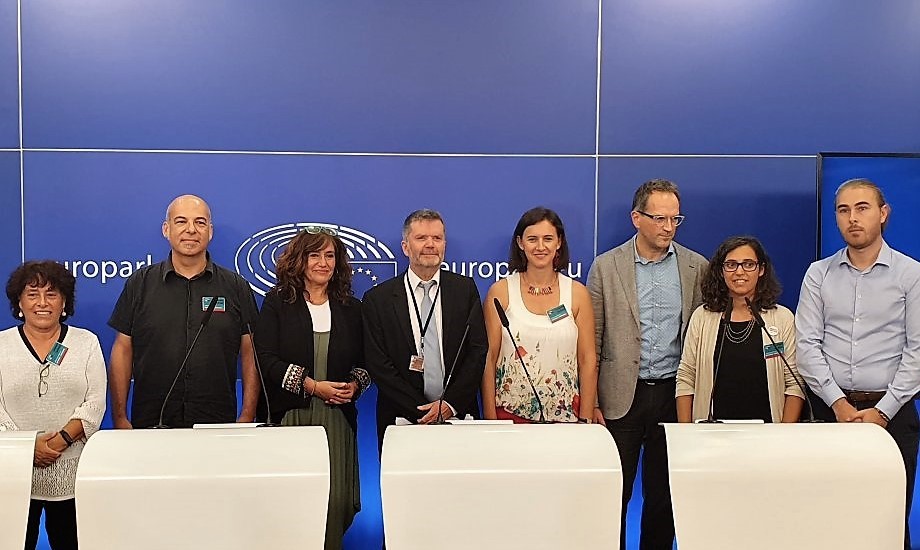PRESS STATEMENT. Monday 18th September, European Parliament, Brussels.
The European Language Equality Network (ELEN) welcomes the proposal by Spain for the inclusion of Catalan, Basque and Galician as full, working EU-official languages, and together with its members: Plataforma per la Llengua, Òmnium Cultural, Euskalgintzaren Kontseilua, A Mesa pola Normalización Lingüística, Obra Cultural Balear, Acció Cultural País Valencià, CIEMEN and Escola Valenciana, calls on all EU Member-States meeting at the EU Council tomorrow, September 19th, to support the Spanish proposal.
Being included brings numerous practical benefits as well as the prestige that official status confers. The result will be positive step towards the recognition and normalisation of our languages as official status at the European level is one of the keys to protecting linguistic rights. There are more than 500 legal provisions of all kinds that require the presence and use of EU official languages, especially in the area of consumer rights, which means that EU-official status has a direct and indirect impact on people’s daily lives.
Inclusion will be an important milestone because it will mean that the EU recognizes the plurilingual nature of Europe and its Member-States. However, it must be clearly stated that this does not mean the end of the process of language minoritization: there is still a long way to go before we reach that goal. We therefore reaffirm our commitment to continue working on all fronts to give our languages the recognition they deserve in order to guarantee the linguistic rights of our peoples.
If the EU “respects linguistic diversity” it must live up to that statement and start by making these three languages EU official. Language rights are human rights, and its time for the EU to recognize that fact and ensure that all citizens are able to use their European languages in the EU institutions.
EU Regulation No.1, written in 1958, enshrines the one language, one state, monolingual mindset. Its out of date and unfit for purpose in a plurilingual Europe. We need a language policy that’s fit for purpose and that works for its citizens. Why should 10 million Catalan speakers not be able to communicate with the EU in their language yet 5 million Finnish speakers can?
We need to make EU language policy inclusive instead of exclusive. It should represent equality, not inequality and discrimination. It should represent what we are aspiring to do with the European project, not entrenching the mistakes of the past.
To conclude, ELEN fully supports the Spanish proposal, and we call on all EU Member-States to back the proposal tomorrow and show that they support European values, democracy and equality.
Statement on behalf of Plataforma per la Llengua, Òmnium Cultural, Kontseilua, A Mesa pola Normalización Lingüística, Obra Cultural Balear, Acció Cultural País Valencià, CIEMEN, Escola Valenciana, and ELEN.
Contact details
ELEN: elen.secretariat@elen.ngo
The European Language Equality Network (ELEN), at a press conference held in the European Parliament today (18th September), welcomes the proposal by Spain for the inclusion of Catalan, Basque and Galician as full, working EU-official languages, and together with its members: Plataforma per la Llengua, Òmnium Cultural, Euskalgintzaren Kontseilua, A Mesa pola Normalización Lingüística, Obra Cultural Balear, Acció Cultural País Valencià, CIEMEN and Escola Valenciana, calls on EU Member-States meeting at the EU Council tomorrow, September 19th, to support the Spanish proposal.
Being included brings numerous practical benefits as well as the prestige that official status confers. The result will be positive step towards the recognition and normalisation of our languages as official status at the European level is one of the keys to protecting linguistic rights. There are more than 500 legal provisions of all kinds that require the presence and use of EU official languages, especially in the area of consumer rights, which means that EU-official status has a direct and indirect impact on people’s daily lives.
Inclusion will be an important milestone because it will mean that the EU recognizes the plurilingual nature of Europe and its Member-States. However, it must be clearly stated that this does not mean the end of the process of language minoritization: there is still a long way to go before we reach that goal. We therefore reaffirm our commitment to continue working on all fronts to give our languages the recognition they deserve in order to guarantee the linguistic rights of our peoples.
If the EU “respects linguistic diversity” it must live up to that statement and start by making these three languages EU official. Language rights are human rights, and its time for the EU to recognize that fact and ensure that all citizens are able to use their European languages in the EU institutions.
EU Regulation No.1, written in 1958, enshrines the one language, one state, monolingual mindset. Its out of date and unfit for purpose in a plurilingual Europe. We need a language policy that’s fit for purpose and that works for its citizens. Why should 10 million Catalan speakers not be able to communicate with the EU in their language yet 5 million Finnish speakers can?
We need to make EU language policy inclusive instead of exclusive. It should represent equality, not inequality and discrimination. It should represent what we are aspiring to do with the European project, not entrenching the mistakes of the past.
To conclude, ELEN fully supports the Spanish proposal, and we call on all EU Member-States to back the proposal tomorrow and show that they support European values, democracy and equality.
Statement on behalf of Plataforma per la Llengua, Òmnium Cultural, Kontseilua, A Mesa pola Normalización Lingüística, Obra Cultural Balear, Acció Cultural País Valencià, CIEMEN, Escola Valenciana, and ELEN.
Contact details
Kontseilua (Euskara): aingeru@kontseilua.eus +34 696 981 662
A Mesa (Galego): cvieito@amesa.gal +34 604 071 394
Òmnium Cultural (Català): aajanovic@omnium.cat +34 627 205 115.
Plataforma per la Llengua (Català): polcruzcorominas@gmail.com +34 646 543 096.
ELEN: elen.secretariat@elen.ngo

